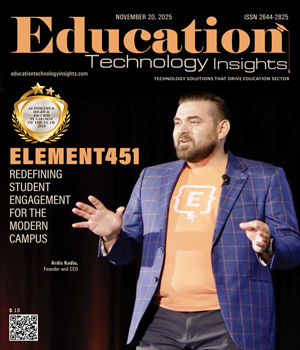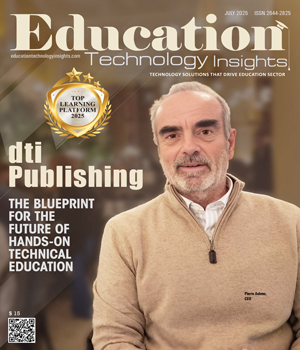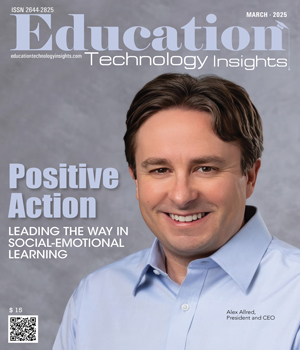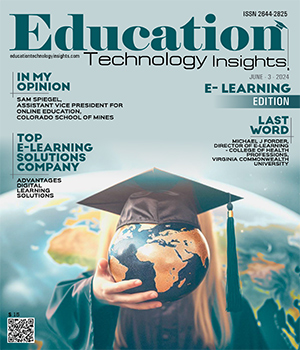THANK YOU FOR SUBSCRIBING
Be first to read the latest tech news, Industry Leader's Insights, and CIO interviews of medium and large enterprises exclusively from Education Technology Insights
Transforming Education Through E-Learning And Gen AI
Shawan Suber, Executive Director of Learning Support Services, Richland School District 2
 Shawan Suber, Executive Director of Learning Support Services, Richland School District 2
Shawan Suber, Executive Director of Learning Support Services, Richland School District 2Throughout history, K-12 public education has been notoriously slow to adapt to changing needs and societal shifts. Despite efforts, federal policies have failed to address disparities in poverty and racial composition within schools, while traditional school calendars still align with an agricultural schedule. Meanwhile, the rapid advancement of technology has left society struggling to keep pace. However, amidst these challenges, there lies a significant opportunity for transformation through the integration of new technologies, particularly artificial intelligence (AI), into educational practices.
Artificial intelligence holds immense potential to revolutionize pedagogical approaches and support systems for students. By leveraging AI algorithms in conjunction with e-learning platforms, educators can access individualized student data, including learning styles, strengths, and weaknesses. This datadriven approach enables educators to tailor learning experiences to meet the specific needs of each student, whether it be for intervention or academic enrichment.
In 2007, Howard Gardner introduced the concept of the Five Minds for the Future, identifying five essential skills crucial for success in the 21st century. These minds encompass both cognitive and interpersonal abilities, including the disciplined mind, synthesizing mind, creating mind, respectful mind, and ethical mind. Gardner's framework serves as a cornerstone for enhancing educators' skill sets and fostering student learning.
The disciplined mind emphasizes mastery within specific domains, such as arts, professions, and scholarly work. In the realm of education, this translates to continuous professional development for educational administrators and teachers. E-learning platforms and AI tools streamline administrative tasks, allowing educators to focus more on student learning. Additionally, on-demand professional development opportunities empower teachers to enhance their intellectual and pedagogical capacities at their convenience.
The synthesizing mind emerges as the most valuable asset for students in the 21st century, given the abundance of information available at their fingertips. AI technologies enable students to access, evaluate, and utilize information effectively, fostering critical thinking and problem-solving skills. For instance, student assessment data can inform the creation of tailored assignments and intervention plans, promoting personalized learning experiences.
The creating mind drives innovation and solutions to complex societal and educational challenges. E-learning, coupled with AI, can alleviate pressures within educational systems, such as teacher shortages and student mental health issues. Generative AI tools facilitate divergent thinking and collaboration among users, fostering creativity and idea refinement.
Finally, the respectful and ethical minds are essential for fostering positive interactions within the educational environment. As technology connects individuals globally, educators and students must embrace diversity and cultivate ethical principles. E-learning and AI tools provide opportunities for cross-cultural learning experiences, while also prompting self-reflection and evaluation of one's character and work ethic.
Ultimately, the integration of e-learning and AI in education holds the promise of building instructional capacity, enhancing student learning, and fostering creativity and ethics in the 21stcentury classroom. By shifting our focus from content delivery to personalized student learning, we can prepare students to thrive in an ever-evolving world. As we embrace educational innovation and creativity, the Five Minds of the Future, complemented by AI technologies, can pave the way for a brighter future in education.
Weekly Brief
Read Also
Navigating Course Map Design
Beyond the Classroom: Supporting Belonging and Wellbeing for International Students
Building Responsible AI Practice Across a University
Designing Engagement That Lasts
Digital Creativity as a Catalyst for Deeper Learning
Protecting Precious Cargo: A Comprehensive Look at School Bus Safety

I agree We use cookies on this website to enhance your user experience. By clicking any link on this page you are giving your consent for us to set cookies. More info



























